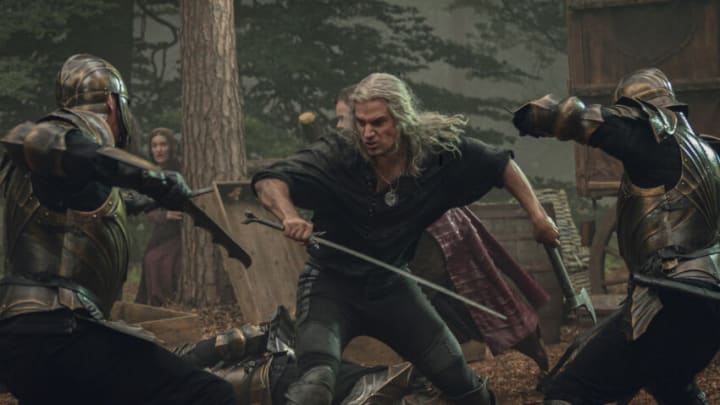The Witcher season 3 has come and gone, and the reaction has been mixed at best. Season 3 currently holds an abysmal 20% audience score on Rotten Tomatoes, with the final two episodes of the season taking the record as the lowest-rated episodes of the show’s entire run. This is the last season which features Henry Cavill as Geralt of Rivia, and showrunner Lauren Hissrich promised he would get a “heroic sendoff.” So where did The Witcher go wrong with season 3?
For my part, I think the answer is that it didn’t; The Witcher season 3 is actually the best season, and it’s not even close. I think the extremely negative reaction to season 3 has more to do with the narratives built around the series, and its own failure to cater to a complicated, passionate group of fandoms which all love The Witcher in their own way.
Now that we’ve all had time to digest The Witcher season 3, the time has come to talk about the franchise’s complicated fandom, and how it has played into the fascinating response to the show’s latest outing.

Dissecting the many fandoms of The Witcher
The Witcher fandom is really an awkward intersection between several different fandoms. There are book readers, who compare the series to the novels by Andrzej Sapkowski; and gamers, who compare it to the video game trilogy by CD Projekt Red, which is essentially a fan fiction sequel to the novels. Those two groups have some overlap; there are gamers who’ve read the books and readers who’ve played the games. Then there are show-only watchers, who just watch the Netflix series but haven’t touched the books or games. And of course, some fans have experienced every version of The Witcher.
It’s a dizzying collision of fandoms, each with their own set of expectations. Book readers often judge the show by its fidelity to the novels, which is fairly common for this sort of adaptation. Things are a bit more complicated for the gamer crowd. If you’ve only played The Witcher games, your frame of reference for The Witcher is essentially a (very good) piece of non-canon fan fiction, with totally different takes on some characters and events.
Nowhere is this confusion more evident than with Radovid, the prince of Redania who received ample screentime in The Witcher season 3. Many fans were upset that he and Jaskier had a romance, which isn’t in the novels. But here’s the thing: Radovid is basically a nothing character in the books. He shows up for a single scene at the very end, as a child, where we learn that one day he’ll go on to become a fearsome ruler biased against mages because the sorceress Philippa Eilheart assassinated the previous king. In the games, which are set years after the books, we see what Radovid’s reign of terror actually looks like. They did a terrific job, which is why Radovid became one of the most memorable villains of the game series.
The TV show is trying to walk a middle line where they include this popular character from the games but put their own spin on it. The show aged up Radvoid and had him ascend to the throne at the end of season 3. Presumably we’ll see his decline into madness and witch hunts as the show goes on, which will take us into material closer to the video games. The romance with Jaskier may play a part in Radovid’s character development, but it’s pretty clear that the show is also gearing up for his slide into tyranny.
This is the kind of tricky dance The Witcher has to do when there are so many pre-exisiting versions of the story.

It’s not the fault of fans that The Witcher has problems
To be clear, I’m not here to make excuses for The Witcher, or blame fans for its missteps or for not understanding its “complicated” plot. I’m one of those people who played the games and read the books before the Netflix series, and generally I’ve been pretty disappointed. I was of the opinion that season 1 botched its chance to establish the show as a Game of Thrones-level adult fantasy series, something which the razor-sharp storytelling of the video games proved was possible in a visual medium. Season 2 deviated so wildly from the source material it was impossible to take seriously as an adaptation. The Witcher: Blood Origin prequel series gave us a generic overthrowing-the-evil-empire story that had little to no basis in Andrzej Sapkowski’s works. Even the animated Nightmare of the Wolf came up short for me; I thought it interpreted the pogrom against the witchers in a way that undermined the spirit of the books, despite being pretty solid otherwise.
In short, I had basically no hope that The Witcher season 3 was going to be good. I’d been burned too many times. So imagine my surprise when it dropped and it was actually…pretty damn good? And shockingly faithful to the novels? In terms of production value, textual fidelity, writing, acting, music, stunts, creatures, and more, The Witcher season 3 was far and away the best season of the show yet.
While season 2 basically invented a brand new, inferior story instead of adapting the books, season 3 changed details but contained just about every major and most minor events from the novel which inspired it, The Time of Contempt. It even brought back material from Blood of Elves that was missing from season 2, as well as some parts of the third book, Baptism of Fire. It was more than I had dared hope.
So imagine my surprise again when a consensus seemed to form online that season 3 was, in fact, the worst season, an enormous disaster that wasted Henry Cavill’s final episodes and represented an all time low point for the show. How could this narrative catch on, when it is so obviously false?
